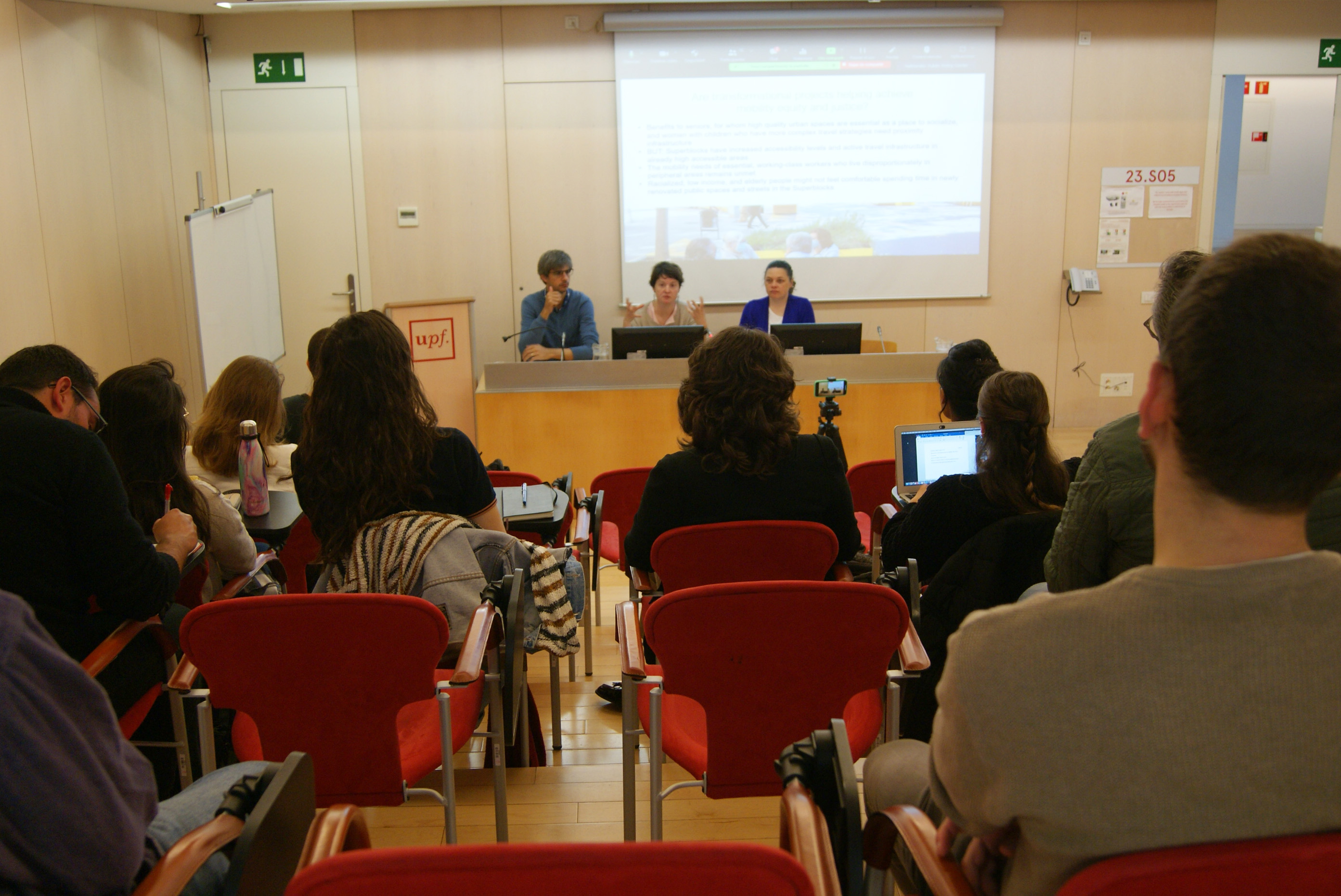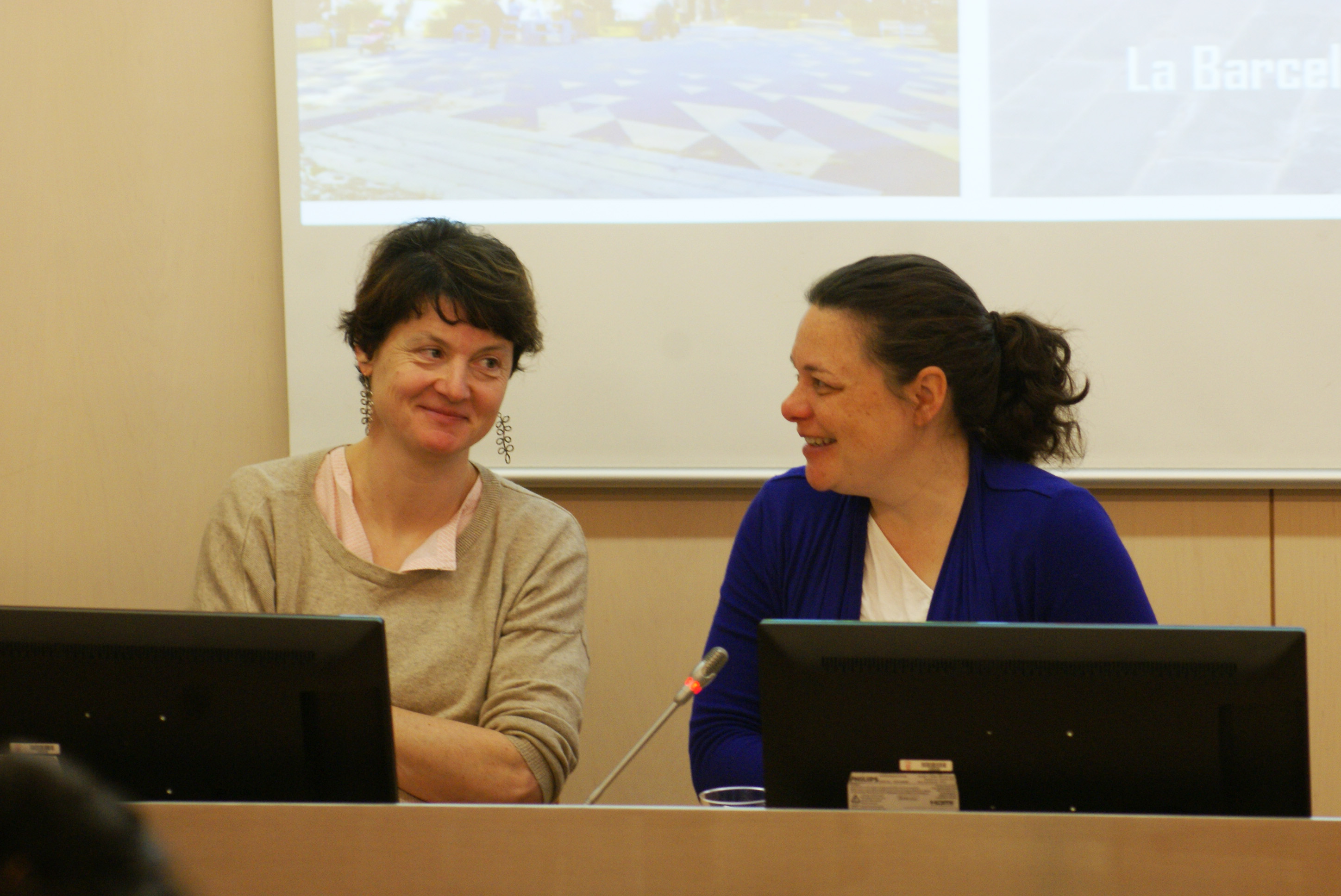“Are transformational projects helping to achieve mobility equity and justice?” Report of the ninth Policy Dialogues session
“Are transformational projects helping to achieve mobility equity and justice?” Report of the ninth Policy Dialogues session
On Wednesday, April 18th, the JHU-UPF Public Policy Center delivered a new session of the Policy Dialogues series, entitled: “Superblocks, health and equity in Barcelona''. Speakers Isabelle Anguelovski, Helen Cole and Oriol Marquet, experts in policymaking for sustainable, healthy and equitable cities, analysed and discussed Barcelona's Superblocks (Superilles in Catalan) project.

The Superblocks project in Barcelona is a groundbreaking urban planning initiative intended to foster greater wellbeing and sustainability in urban settings. This project has played a key role in cementing Barcelona's reputation as a trailblazer in the development of urban environments that are responsive to the demands of contemporary and future inhabitants, especially in light of the numerous social and ecological challenges that we are confronting.
Despite its potential as a transformative urban policy and international reputability, the Superblocks project has also faced criticism and resistance. As this controversy demonstrates, the project's social impact – particularly, its impact on health, equity, and wellbeing– is a complex and multifaceted issue that necessitates thorough and interdisciplinary examination. This was the objective of the recent Policy Dialogues session.
The session was initiated by Isabelle Anguelovski, Director of the Barcelona Lab for Urban Environmental Justice and Sustainability (BCNUEJ). Her discussion centred on issues of equity and justice relating to transport, transit planning, and green space planning, with a particular focus on Barcelona's Superblocks initiative. Anguelovski argued that the Superblocks programme is situated within an ambitious and transformative urban design project, which seeks to achieve multiple objectives concurrently, including climate change mitigation and adaptation, the creation of open and green urban spaces, the reduction of noise pollution, and the establishment of a new urban development trajectory and city vision. The initiative also interrogates dominant narratives regarding economic and spatial growth and is currently being evaluated as a feminist intervention.
During her presentation, Anguelovski raised different questions about the Superblocks project such as, what equity concerns emerge and remain pertinent in transformative urban planning? Is transformative urban planning targeting the neighbourhoods that need it the most? Do transformational projects shift burdens to other spaces and neighbourhoods? Are transformational projects helping achieve mobility equity and justice? Is transformational urban planning contributing to green gentrification? And is it contributing to a different model of civic participation in planning and design?
In the second part of the session, Helen Cole, Senior Researcher at the Institute of Environmental Science and Technology (ICTA) at the Universitat Autònoma de Barcelona (UAB), presented her research project “Strengthening the Impact of Public Spaces to improve the health and wellbeing of Barcelona from an intersectional feminist perspective”. The study in question is one component of a program funded by Barcelona's city council that supports research endeavours related to the COVID-19 pandemic.
With this investigation, Cole sought to expand the scope of the project by considering the broader context of change that accompanies gentrification. In particular, to examine how residents' health, especially that of residents who are less privileged, might be impacted when a city becomes gentrified and people are displaced from neighbourhoods that have more green or open spaces. Her research also adopted a feminist perspective, recognising the disproportionate burden that women and other gender minorities bore during the pandemic. Women were overrepresented in essential public-facing jobs, such as healthcare and care work, and shouldered the majority of unpaid care work at home, which intensified during the pandemic due to the closure of services and schools. Against this backdrop, Cole’s investigation engaged with how the pandemic fundamentally transformed how people perceived and utilised public spaces: “We're thinking about the context of the pandemic…we know that this pandemic context has changed the way that we use and perceive public space, particularly because of the need to social distance and the feeling of safety of being outside that was not only felt by people, but was being promoted as how we should be behaving”, Cole pointed out.
In the final presentation, Oriol Marquet, Ramón y Cajal fellow at the UAB’s Geography Department, leader of the Urban Mobility, presented an overview of the superblocks and the links between superblocks projects and changes in transportation patterns in Barcelona: “most of the expected outcomes of the superblocks are an effective way to change mobility and change transportation,” Marquet reflected.
According to Marquet, the Superblocks project represents a highly innovative urban model, characterised by a reordering of priorities, an ambitious scope, and a multifaceted approach that encompasses not only traffic reduction but also social and feminist considerations. Nevertheless, the implementation of this project presents numerous challenges, including the potential for public resistance and constraints on its local acceptance, the weight of public opinion and the political costs involved, and the potential for the concept of Superblocks to become stigmatised or undermined. He expressed concerns about the original Superblocks concept being somewhat “watered down” in the City Council’s latest iterations and plans, saying that any related projects should maintain the transformational elements of the original Superblocks objectives.
Following the three presentations, there was a rich question and answer session with the audience, in which all participants explored in more depth issues relating to sustainable transport, future plans for Superblocks in Barcelona, gentrification and equity.

Follow us on Twitter to hear about our upcoming Policy Dialogues seminars @pubpolcenter and our Instagram account @publicpolicycenter
